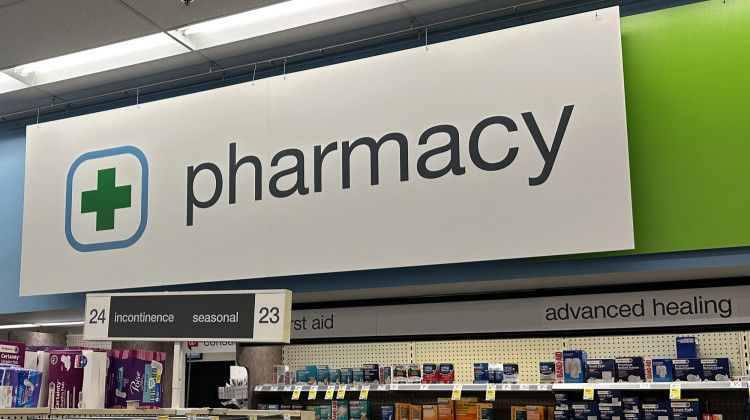
Rita Winkeler is head of the Murray Parents Association. Her son, Mark, lives at Murray Developmental Center in Centralia, Illinois.
(Benjy Jeffords/WSIU)The Murray Developmental Center in Centralia, Illinois, is home to around 250 residents, many of whom are medically fragile. During the pandemic, these residents and their families have been separated by lockdowns, which have continued long after the rest of the country has been opening up.
Rita Winkeler, who runs the Murray Parents Association, said the pandemic was devastating for her family — and for many others with loved ones at the facility.
“One day they [told] us you can no longer come in, and the next time we got to see our loved ones was four months later,” Winkeler said
On another occasion, Winkeler’s family had plans to visit her son the following day. But the night before, a staff member tested positive for COVID-19.
“So then we had another two weeks to wait,” she said.

Families with loved ones in facilities for the developmentally disabled are especially eager to spend the holidays together this year. But as the pandemic continues, they face new uncertainty and continuing lockdowns even as the rest of the country tries to get back to normal.
Margaret Nygren, who heads the American Association on Intellectual and Developmental Disabilities, said the impact of COVID-related closures is greater for people in congregate care facilities because they are already somewhat isolated from the rest of the world.
“Taking away even small amounts of access to the larger world can be devastating,” Nygren said.
Murray residents and their families faced the same pandemic challenges as everyone else — uncertainty, isolation and worry. But family members of people with intellectual and developmental disabilities face additional challenges, trying to help their loved ones understand what’s going on and why they’re not able to visit.
Some of Murray’s residents understood what was going on, like Ineke, whose guardians requested her last name not be used. Ineke said she’s proud of the way she has stayed strong.
“This pandemic, I've been a trooper right through it,” Ineke said.
To help her pass time when the facility was on lockdown, Ineke said she turned to arts and crafts.

Other residents, like Winkeler’s son Mark, don’t have the capacity to understand why they are suddenly unable to see their families.
“How do you explain to someone, like our son, who functions like a nine month old?” Winkeler said. “All of a sudden his [parents are] not coming anymore. It was just really horrible.”
Rita Hicks tried to keep in touch with her sister, Renee Horn, who lives at Murray. But since Horn is non-verbal, Hicks said phone calls have been difficult.
“She makes her little noises into the phone and I talk,” Hicks said. “So I guess maybe that helped a little too. But you never really know what she understands.”
The pandemic caused Hicks to miss her sister’s 50th birthday.
“We were going to have this great party and all of this stuff,” Hicks said. “And instead, I mean, I did send stuff and they all decorated and they got dressed up and they had cupcakes. But I wasn't there for it.”

The holidays have been painful for families, who normally bring their loved ones home to visit or celebrate at Murray, like Hicks does with her sister.
“We fill up Christmas morning, we bring pancakes or donuts and we open her presents,” Hicks said.
But even as some restrictions have eased, plans can be derailed if a staff member catches COVID — something Winkeler said canceled the facility’s Halloween celebration.
Nygren said facilities like Murray are usually licensed by the state and may be subject to stricter public health guidelines. That, combined with a workforce shortage that predates the pandemic, poses challenges.
“It’s a situation where one staff person coming in can affect the lives of a large number of people, because they’re all dependent on a very small number of staff,” she said.
Ineke just hopes that she’ll be able to see her family again soon.
“Grandma Ruby and Aunt Cathy, I’ll see you for Christmas,” Ineke said. “I love you. I love everybody.”
Expressing that love from a distance just isn’t the same. Whether her family will be able to visit on Christmas remains up in the air.
This story comes from a reporting collaboration that includes WSIU and Side Effects Public Media — a public health news initiative based at WFYI. Follow Steph on Twitter: @stephgwhiteside.
9(MDAyMzk1MzA4MDE2MjY3OTY1MjM5ZDJjYQ000))
 DONATE
DONATE






 Support WFYI. We can't do it without you.
Support WFYI. We can't do it without you.